英语一般疑问句
英语中一般疑问句
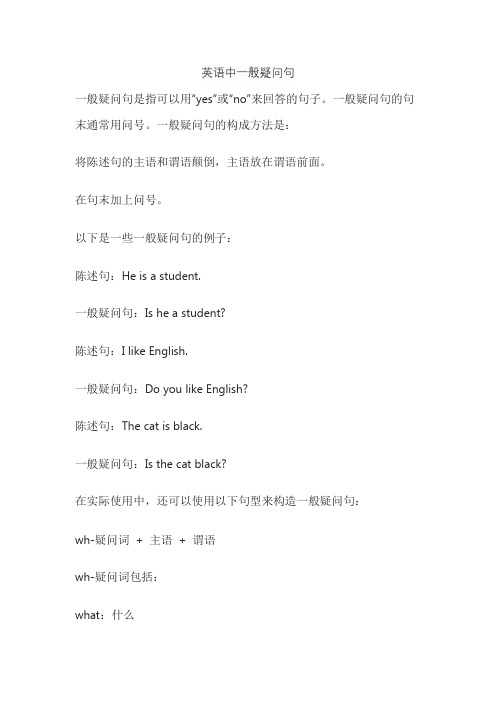
英语中一般疑问句
一般疑问句是指可以用“yes”或“no”来回答的句子。
一般疑问句的句末通常用问号。
一般疑问句的构成方法是:
将陈述句的主语和谓语颠倒,主语放在谓语前面。
在句末加上问号。
以下是一些一般疑问句的例子:
陈述句:He is a student.
一般疑问句:Is he a student?
陈述句:I like English.
一般疑问句:Do you like English?
陈述句:The cat is black.
一般疑问句:Is the cat black?
在实际使用中,还可以使用以下句型来构造一般疑问句:
wh-疑问词+ 主语+ 谓语
wh-疑问词包括:
what:什么
who:谁
where:在哪里
when:什么时候
why:为什么
how:如何
以下是一些使用wh-疑问词构造一般疑问句的例子:陈述句:The book is on the table.
一般疑问句:What is on the table?
陈述句:The man is my father.
一般疑问句:Who is your father?
陈述句:I went to the park yesterday.
一般疑问句:When did you go to the park?
陈述句:I like to eat apples.
一般疑问句:Why do you like to eat apples?
陈述句:I can run very fast.
一般疑问句:How fast can you run?。
英语一般问句和特殊问句的构成
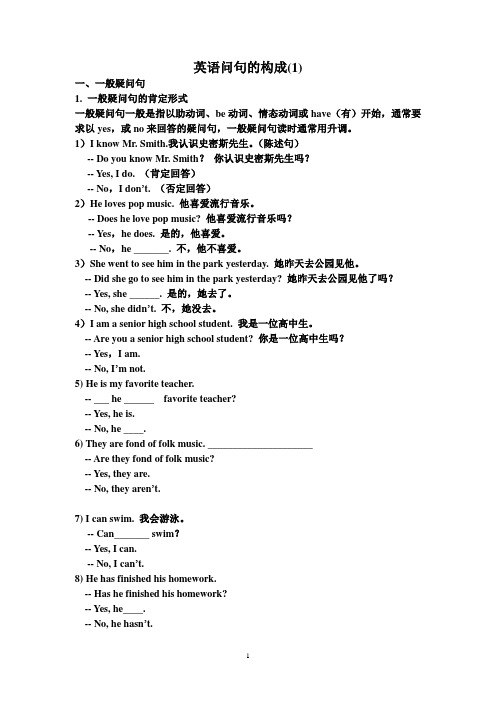
英语问句的构成(1)一、一般疑问句1. 一般疑问句的肯定形式一般疑问句一般是指以助动词、be动词、情态动词或have(有)开始,通常要求以yes,或no来回答的疑问句,一般疑问句读时通常用升调。
1)I know Mr. Smith.我认识史密斯先生。
(陈述句)-- Do you know Mr. Smith?你认识史密斯先生吗?-- Yes, I do. (肯定回答)-- No,I don’t. (否定回答)2)He loves pop music. 他喜爱流行音乐。
-- Does he love pop music? 他喜爱流行音乐吗?-- Yes,he does. 是的,他喜爱。
-- No,he _______. 不,他不喜爱。
3)She went to see him in the park yesterday. 她昨天去公园见他。
-- Did she go to see him in the park yesterday? 她昨天去公园见他了吗?-- Yes, she ______. 是的,她去了。
-- No, she didn’t. 不,她没去。
4)I am a senior high school student. 我是一位高中生。
-- Are you a senior high school student? 你是一位高中生吗?-- Yes,I am.-- No, I’m not.5) He is my favorite teacher.-- ___ he ______ favorite teacher?-- Yes, he is.-- No, he ____.6) They are fond of folk music. _____________________-- Are they fond of folk music?-- Yes, they are.-- No, they aren’t.7) I can swim. 我会游泳。
英语一般疑问句的概念与构成方法
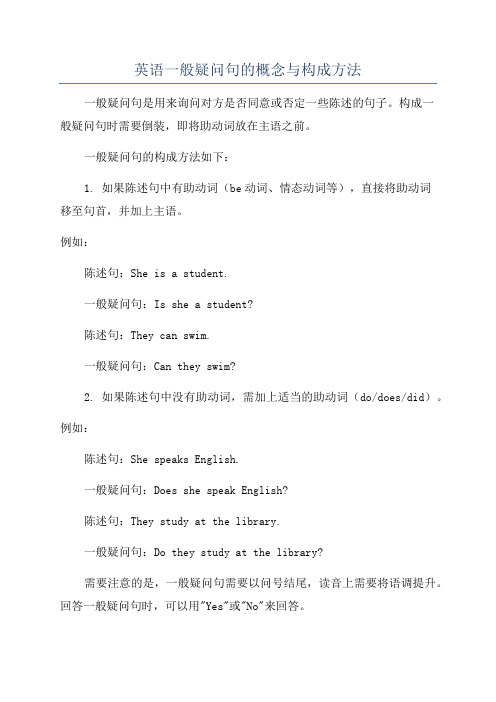
英语一般疑问句的概念与构成方法
一般疑问句是用来询问对方是否同意或否定一些陈述的句子。
构成一
般疑问句时需要倒装,即将助动词放在主语之前。
一般疑问句的构成方法如下:
1. 如果陈述句中有助动词(be动词、情态动词等),直接将助动词
移至句首,并加上主语。
例如:
陈述句:She is a student.
一般疑问句:Is she a student?
陈述句:They can swim.
一般疑问句:Can they swim?
2. 如果陈述句中没有助动词,需加上适当的助动词(do/does/did)。
例如:
陈述句:She speaks English.
一般疑问句:Does she speak English?
陈述句:They study at the library.
一般疑问句:Do they study at the library?
需要注意的是,一般疑问句需要以问号结尾,读音上需要将语调提升。
回答一般疑问句时,可以用"Yes"或"No"来回答。
英语各种疑问句详细解释——_一般疑问句、特殊疑问句、选择疑问句、反意疑问句

各种疑问句的详细介绍疑问句(questions)指提出问题,请对方回答的句子。
疑问句句末要用问号。
按结构可分为四种:一般疑问句、特殊疑问句、选择疑问句、反意疑问句。
(一)一般疑问句1、一般疑问句概述一般疑问句(general questions),也可称为“yes/no” questions(是否型问句),因为它一般是由yes或no回答的,如:—Can you swim to the other side?你能游到对岸吗?—Yes, I can.是的,我能。
—No,I can’t.不,我不能。
—Have you locked the door?你锁门了吗?—Yes,I have.是的,锁了。
—No,I haven’t. 不,没有锁。
2一般疑问句的结构(1)基本的结构为:be/助动词/情态动词+主语+谓语/表语+(其他),句子要读升调,如:Are they your friends?他们是你的朋友吗?Does he go to school on foot?他是步行去上学吗?Will you be free tonight?你今晚有空吗?Can you play basketball?你会打篮球吗?(2)陈述句亦可用作一般疑问句,多用在非正式文体中,句末有问号,用升调,如:Somebody is with you?有人和你一起吗?He didn’t finish the work?他没有做完活吗?You are fresh from America,I suppose?我猜,你刚从美国回来吧?3、一般疑问句的答语(1)一般疑问句一般由yes或no来回答,如:—Are you tired?你累了吗?—Yes,I am.是的,累了。
—No, I’m not.不,不累。
—Does she do the cleaning?她扫除了吗?—Yes ,she does.是的,她打扫了。
—No,she doesn’t.不,她没打扫。
英语一般疑问句的三种形式
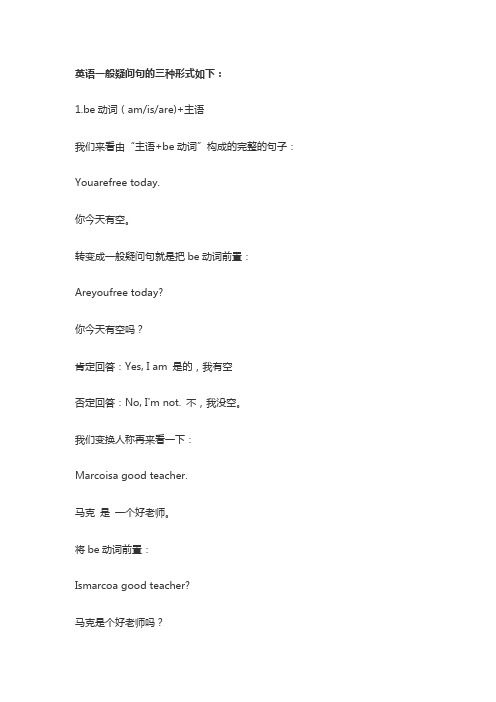
英语一般疑问句的三种形式如下:1.be动词(am/is/are)+主语我们来看由“主语+be动词”构成的完整的句子:Youarefree today.你今天有空。
转变成一般疑问句就是把be动词前置:Areyoufree today?你今天有空吗?肯定回答:Yes, I am 是的,我有空否定回答:No, I'm not. 不,我没空。
我们变换人称再来看一下:Marcoisa good teacher.马克是一个好老师。
将be动词前置:Ismarcoa good teacher?马克是个好老师吗?肯定回答:Yes, he is. 他是否定回答:Nno, he isn't . 不,他不是。
第三人称复数也是一样的变法:Theyare outside the room.他们在房间外面。
Aretheyoutside the room?肯定回答:Yes, they are. 是的。
否定回答:No, they aren't.不是,他们没有在外头。
2.助动词+主语首先我们来看一下助动词都有哪些:will,can,may,must,should,would,could Icanhelp you.我可以帮助你。
转换成一般疑问句,同样是助动词前置:canIhelp you?你可以帮助我吗?肯定回答:Yes, I can. 我可以。
否定回答:No,I can't. 我不可以。
其他人称也是一样的方法:Wemustbe quiet in the classroom.我们必须保持在教室里要安静。
Mustwebe quiet in the classroom?我们必须在教室里保持安静吗?3."动词do/does+动词原形+主语第三种情况“主语+动词”是最特殊的,因为不再是把动词前置,而是要按主语的人称分别使用助动词do或者does,原有的动词一律变成原形。
我们来看一个例子:Marcostudieshard.马克学习刻苦。
英语中的一般疑问句
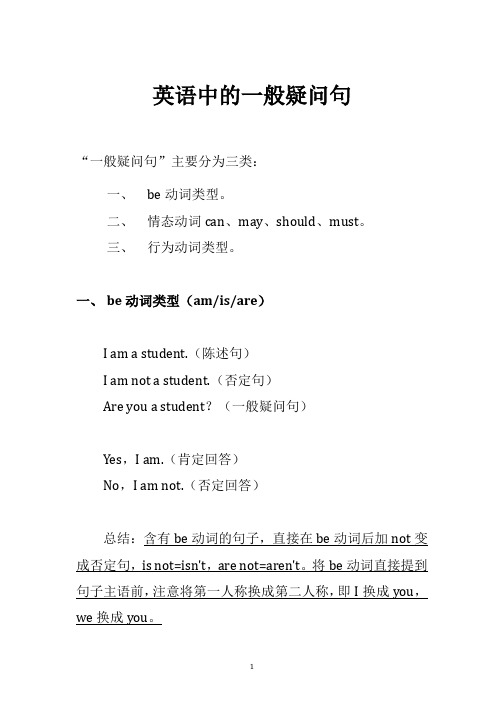
英语中的一般疑问句“一般疑问句”主要分为三类:一、be动词类型。
二、情态动词can、may、should、must。
三、行为动词类型。
一、be动词类型(am/is/are)I am a student.(陈述句)I am not a student.(否定句)Are you a student?(一般疑问句)Yes,I am.(肯定回答)No,I am not.(否定回答)总结:含有be动词的句子,直接在be动词后加not变成否定句,is not=isn't,are not=aren't。
将be动词直接提到句子主语前,注意将第一人称换成第二人称,即I换成you,we换成you。
二、情态动词类型(can/may/should/must)He can play basketball.(陈述句)He can not play basketball.(否定句)Can he play basketball?(一般疑问句)Yes,he can.(肯定回答)No,he can not.(否定回答)总结:含有情态动词的句子,变否定直接在情态动词后加not,变一般疑问句直接将情态动词提前。
三、行为动词类型I go to school by bike.(陈述句)I do not go to school by bike.(否定句)Do you go to school by bike?(一般疑问句)Yes,I do.(肯定回答)No,I do not.(否定回答)She goes to school by bike.(陈述句)She does not go to school by bike.(否定句)Does she go to school by bike?(一般疑问句)Yes,she does.(肯定回答)No,she does not.(否定回答)总结:行为动词变否定和一般疑问需要借助助动词do 或者does,当主语是第三人称单数时,助动词用does。
英语一般疑问句
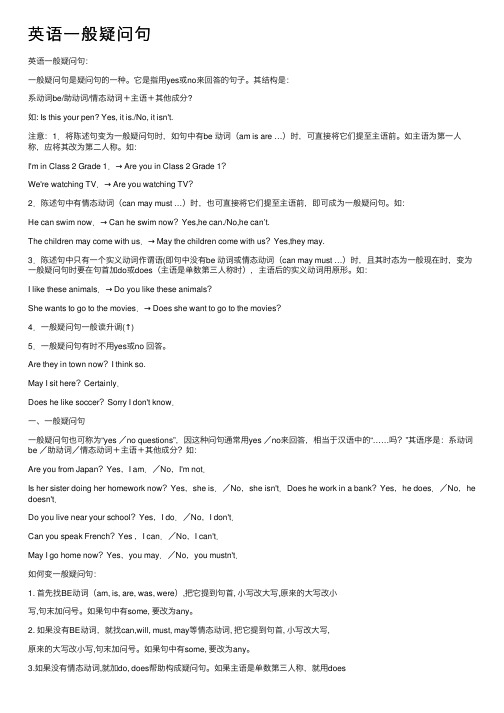
英语⼀般疑问句英语⼀般疑问句:⼀般疑问句是疑问句的⼀种。
它是指⽤yes或no来回答的句⼦。
其结构是:系动词be/助动词/情态动词+主语+其他成分?如: Is this your pen? Yes, it is./No, it isn't.注意:1.将陈述句变为⼀般疑问句时,如句中有be 动词(am is are …)时,可直接将它们提⾄主语前。
如主语为第⼀⼈称,应将其改为第⼆⼈称。
如:I'm in Class 2 Grade 1.→ Are you in Class 2 Grade 1?We're watching TV.→ Are you watching TV?2.陈述句中有情态动词(can may must …)时,也可直接将它们提⾄主语前,即可成为⼀般疑问句。
如:He can swim now.→ Can he swim now?Yes,he can./No,he can’t.The children may come with us.→ May the children come with us?Yes,they may.3.陈述句中只有⼀个实义动词作谓语(即句中没有be 动词或情态动词(can may must …)时,且其时态为⼀般现在时,变为⼀般疑问句时要在句⾸加do或does(主语是单数第三⼈称时),主语后的实义动词⽤原形。
如:I like these animals.→ Do you like these animals?She wants to go to the movies.→ Does she want to go to the movies?4.⼀般疑问句⼀般读升调(↑)5.⼀般疑问句有时不⽤yes或no 回答。
Are they in town now?I think so.May I sit here?Certainly.Does he like soccer?Sorry I don't know.⼀、⼀般疑问句⼀般疑问句也可称为“yes /no questions”,因这种问句通常⽤yes /no来回答,相当于汉语中的“……吗?”其语序是:系动词be /助动词/情态动词+主语+其他成分?如:Are you from Japan?Yes,I am./No,I'm not.Is her sister doing her homework now?Yes,she is./No,she isn't.Does he work in a bank?Yes,he does./No,he doesn't.Do you live near your school?Yes,I do./No,I don't.Can you speak French?Yes ,I can./No,I can't.May I go home now?Yes,you may./No,you mustn't.如何变⼀般疑问句:1. ⾸先找BE动词(am, is, are, was, were),把它提到句⾸, ⼩写改⼤写,原来的⼤写改⼩写,句末加问号。
英语一般疑问句
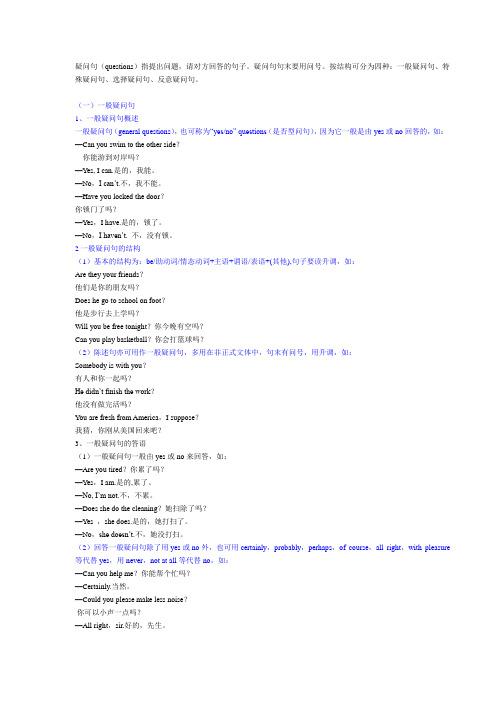
疑问句(questions)指提出问题,请对方回答的句子。
疑问句句末要用问号。
按结构可分为四种:一般疑问句、特殊疑问句、选择疑问句、反意疑问句。
(一)一般疑问句1、一般疑问句概述一般疑问句(general questions),也可称为“yes/no” questions(是否型问句),因为它一般是由yes或no回答的,如:—Can you swim to the other side?你能游到对岸吗?—Yes, I can.是的,我能。
—No,I can’t.不,我不能。
—Have you locked the door?你锁门了吗?—Yes,I have.是的,锁了。
—No,I haven’t. 不,没有锁。
2一般疑问句的结构(1)基本的结构为:be/助动词/情态动词+主语+谓语/表语+(其他),句子要读升调,如:Are they your friends?他们是你的朋友吗?Does he go to school on foot?他是步行去上学吗?Will you be free tonight?你今晚有空吗?Can you play basketball?你会打篮球吗?(2)陈述句亦可用作一般疑问句,多用在非正式文体中,句末有问号,用升调,如:Somebody is with you?有人和你一起吗?He didn’t finish the work?他没有做完活吗?You are fresh from America,I suppose?我猜,你刚从美国回来吧?3、一般疑问句的答语(1)一般疑问句一般由yes或no来回答,如:—Are you tired?你累了吗?—Yes,I am.是的,累了。
—No, I’m not.不,不累。
—Does she do the cleaning?她扫除了吗?—Yes ,she does.是的,她打扫了。
—No,she doesn’t.不,她没打扫。
- 1、下载文档前请自行甄别文档内容的完整性,平台不提供额外的编辑、内容补充、找答案等附加服务。
- 2、"仅部分预览"的文档,不可在线预览部分如存在完整性等问题,可反馈申请退款(可完整预览的文档不适用该条件!)。
- 3、如文档侵犯您的权益,请联系客服反馈,我们会尽快为您处理(人工客服工作时间:9:00-18:30)。
英语一般疑问句:一般疑问句是疑问句的一种。
它是指用yes或no来回答的句子。
其结构是:系动词be/助动词/情态动词+主语+其他成分?如: Is this your pen? Yes, it is./No, it isn't.注意:1.将陈述句变为一般疑问句时,如句中有be 动词(am is are …)时,可直接将它们提至主语前。
如主语为第一人称,应将其改为第二人称。
如:I'm in Class 2 Grade 1.→ Are you in Class 2 Grade 1?We're watching TV.→ Are you watching TV?2.陈述句中有情态动词(can may must …)时,也可直接将它们提至主语前,即可成为一般疑问句。
如:He can swim now.→ Can he swim now?Yes,he can./No,he can’t.The children may come with us.→ May the children come with us?Yes,they may.3.陈述句中只有一个实义动词作谓语(即句中没有be 动词或情态动词(can may must …)时,且其时态为一般现在时,变为一般疑问句时要在句首加do或does(主语是单数第三人称时),主语后的实义动词用原形。
如:I like these animals.→ Do you like these animals?She wants to go to the movies.→ Does she want to go to the movies?4.一般疑问句一般读升调(↑)5.一般疑问句有时不用yes或no 回答。
Are they in town now?I think so.May I sit here?Certainly.Does he like soccer?Sorry I don't know.一、一般疑问句一般疑问句也可称为“yes /no questions”,因这种问句通常用yes /no来回答,相当于汉语中的“……吗?”其语序是:系动词be /助动词/情态动词+主语+其他成分?如:Are you from Japan?Yes,I am./No,I'm not.Is her sister doing her homework now?Yes,she is./No,she isn't.Does he work in a bank?Yes,he does./No,he doesn't.Do you live near your school?Yes,I do./No,I don't.Can you speak French?Yes ,I can./No,I can't.May I go home now?Yes,you may./No,you mustn't.如何变一般疑问句:1. 首先找BE动词(am, is, are, was, were),把它提到句首, 小写改大写,原来的大写改小写,句末加问号。
如果句中有some, 要改为any。
2. 如果没有BE动词,就找can,will, must, may等情态动词, 把它提到句首, 小写改大写,原来的大写改小写,句末加问号。
如果句中有some, 要改为any。
3.如果没有情态动词,就加do, does帮助构成疑问句。
如果主语是单数第三人称,就用does帮助构成疑问句,把它放到句首, 小写改大写,原来的大写改小写,句末加问号,原来的动词改为原型。
如果句中有some, 要改为any。
如果主语不是单数第三人称,就用do帮助构成疑问句, 把它放到句首, 小写改大写,原来的大写改小写,句末加问号。
原来的动词不变。
如果句中有some, 要改为any。
4.如果句子是一般过去时,要加did帮助构成疑问句, 小写改大写,原来的大写改小写,动词改为原型,句末加问号。
如果句中有some, 要改为any。
如何变特殊疑问句:1.首先确定特殊疑问词.特殊疑问词:what(什么) when(什么时候) where(在哪里) who(谁)whose(谁的) what time(几点) how old(几岁) what day(星期几)how many(多少)(接可数名词) how much(多少)(接不可数名词) how often (多久一次) 2. 特殊疑问词加一般疑问句,句末加问号。
按要求改写下列句子:1.I am going to fish in Xili Lake.(改为一般疑问句)2.The walls were dirty yesterday.( 改为一般疑问句)3.I’m going to play the piano.(对划线部分提问)4.Mary likes swimming. (改为否定句)5.The basketball is under the bed.(对划线部分提问)6.Helen was in the kitchen.(对划线部分提问)一般疑问句在英语的学习中,一般疑问句的转换及回答是经常碰到的问题,现在我们就来探讨一下有关一般疑问句的问题。
一、什么是一般疑问句用Y es或No作答的疑问句叫一般疑问句。
一般疑问句还有下列特点:1、以be动词、助动词或情态动词开头;例:Is your father a teacher? Does Catherine like animals? Can Jenny speak French?2、往往读升调;3、译成汉语,都可以带上“吗”,例如上面三句可分别译为:你父亲是老师吗?凯瑟琳喜欢动物吗?詹妮会说法语吗?二、例何将陈述句变成一般疑问句?要将陈述句变成一般疑问句,可以遵循下列步骤:1.看句中有没有be动词(am、is、are、was、were)、助动词(do、does、did、have、had)或情态动词(can、must、will、may等),如果有,将其提到句首,句末打上问号即可。
例:It was rainy yesterday. →Was it rainy yesterday?Tom's father can play the piano. →Can Tom's father play the piano?I have finished my homework. →Have you finished your homework?2.如果句中没有be动词、助动词或情态动词,则根据谓语动词的形式借助do的相应形式放在句首。
具体方法是:如果谓语动词是原形,则借do;如果谓语动词是一般现在时第三人称单数形式,则借does;如果谓语动词是过去式,则借did. 需要注意的是,借does或did 后,原句的谓语动词要变回原形。
例:They go to school by bike. →Do they go to school by bike?Bill gets up at 6:30 every day. →Does bill gets up at 6:30 every day?The students saw a film yesterday. →Did the students see a film yesterday?三.陈述句变一般疑问句应注意的事项陈述句变成一般疑问句除了遵循上述规则以外,还应注意下列几点:1.如果陈述句中有第一人称,则变问句时最好要变为第二人称。
例:I usually have lunch at school. →Do you usually have lunch at school?My father is playing soccer. →Is your father playing soccer?2.如果陈述句中有some, 则变问句时往往要变成any 。
例:There is some water on the playground. →Is there any water on the playground?3.复合句变一般疑问句通常只变主句,从句不变。
例:I know he comes from Canada. →Do you know he comes from Canada?4.如果句中含有实义动词have且表示“有”时,除借do外,也可将其直接提到句首。
例:I have some friends in America. →Have you any friends in America?/Do you have any friends in America?四.一般疑问句的回答一般疑问句往往采用简短回答,共由三部分(三个单词)组成,对这三部分(三个单词)的确定可以概括例下:1.第一个词:不是Y es就是No。
(有时根据语气的不同,Y es可由Sure, Certainly, Of course 等代替.NO可由sorry 代替.)2.第二个词:问谁答谁。
即答语中的主语须与问句的主语一致(但必须用主格代词)。
例:Does she clean her room every day? Y es, she does. Is Anna′s father a doctor? No,he isn′t.如果主语是this that,回答时用it 代替,如果问句中主语these, those,回答时用they′代替。
3.第三个词:用什么问,用什么答。
即沿用问句中的引导词。
Can Jim play soccer? Y es, he can./Does Mr Bean speak English? Y es, he does. 需要注意问题:(1).用may 引导的问句,肯定回答用may,否定回答用can′t 或mustn′t,用must 引导的问句,肯定回答用must,否定回答用needn′t.例:May I go to the park now? Y es, you may. /No, you mustn′t.Must I wash my clothes now? Y es, you must. /No, you needn′t.4.用No开头作否定回答时,结尾要加上not。
因为回答必须是三部分,所以否定回答必须缩写,而肯定回答不能缩写。
例:Did Thomas come here yesterday? Y es, he did./ No ,he didn′t.Is Lin Lin in Class 3? Y es, she is. / No, she isn′t.或(No, she′s not).1. His father is an English teacher.2. These cats are crying.3. They can swim.4. I like to read English.5. I go to school on foot.6. He likes English.7. His father goes to work by bus.8. He is crying under the tree.9. His birthday is on the twentieth ofNovember.10. Mrs. Li and Kitty are in a big shop.11. Kitty is wearing her new uniform.12. The boy under the tree is hungry.13. He goes to school every day.15. I want to have a model car.16. She wants a cup of coffee.17. Mrs. Li and Kitty watch television atnight.18. I do my homework after school.特殊疑问句以疑问词开头,对句中某一成分提问的句子叫特殊疑问句。
